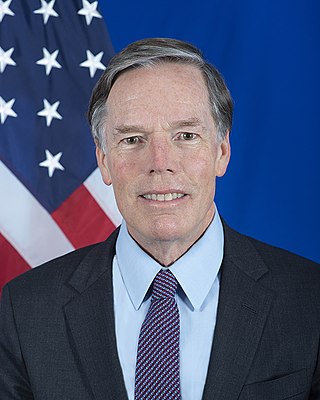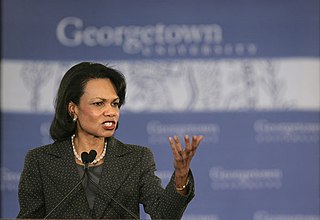Related Research Articles

A diplomat is a person appointed by a state, intergovernmental, or nongovernmental institution to conduct diplomacy with one or more other states or international organizations.

Lawrence Sidney Eagleburger was an American statesman and career diplomat, who served briefly as the secretary of state under President George H. W. Bush from December 1992 to January 1993, one of the shortest terms in modern history. Previously, he had served in lesser capacities under Presidents Richard Nixon, Jimmy Carter, and Ronald Reagan, and as deputy secretary of state to James Baker under George H. W. Bush. Eagleburger is the only career Foreign Service Officer to have served as secretary of state. He was also Deputy Assistant Secretary of Defense from January to May 1973. As a career member of the United States Senior Foreign Service, he attained the rank of Career Ambassador on April 12, 1984.

John Dimitri Negroponte is an American diplomat. In 2018, he was a James R. Schlesinger Distinguished Professor at the Miller Center for Public Affairs at the University of Virginia. He is a former J.B. and Maurice C. Shapiro Professor of International Affairs at the George Washington University's Elliott School of International Affairs. Prior to this appointment, he served as a research fellow and lecturer in international affairs at Yale University's Jackson Institute for Global Affairs, United States Deputy Secretary of State (2007–2009), and the first ever Director of National Intelligence (2005–2007).

The United States Foreign Service is the primary personnel system used by the diplomatic service of the United States federal government, under the aegis of the United States Department of State. It consists of over 13,000 professionals carrying out the foreign policy of the United States and aiding U.S. citizens abroad. Its current director general is Marcia Bernicat.

Karen Parfitt Hughes is the global vice chair of the public relations firm Burson-Marsteller. She served as the Under Secretary of State for Public Diplomacy and Public Affairs in the U.S. Department of State and as a counselor to President George W. Bush.
Diplomatic rank is a system of professional and social rank used in the world of diplomacy and international relations. A diplomat's rank determines many ceremonial details, such as the order of precedence at official processions, table seatings at state dinners, the person to whom diplomatic credentials should be presented, and the title by which the diplomat should be addressed.

Thomas Reeve Pickering is a retired United States ambassador. Among his many diplomatic appointments, he served as U.S. ambassador to the United Nations from 1989 to 1992.

Christopher Robert Hill is an American diplomat who is United States Ambassador to Serbia. Previously, he was George W. Ball Adjunct Professor at Columbia University in the City of New York, the Chief Advisor to the Chancellor for Global Engagement and Professor of the Practice in Diplomacy at the University of Denver. Prior to this position, he was the Dean of the Josef Korbel School of International Studies at the university, a position he held from September 2010 to December 2017.

Robert Nicholas Burns is an American diplomat and international relations scholar who served as the United States ambassador to China from 2022 to 2025.
Ronald Eldredge Neumann is an American diplomat who served as the United States ambassador to Afghanistan (2005–2007), Bahrain (2001–2004) and Algeria (1994–1997). He is the son of former ambassador Robert G. Neumann and traveled extensively after college in Afghanistan while his father was ambassador there. Only one other father-and-son pair, John Adams and his son, John Quincy Adams, have served as ambassadors to the same country; both Adamses served as ministers to Britain. He pronounces his last name Newmann and his name is sometimes seen spelled that way.

A Foreign Service officer (FSO) is a commissioned member of the United States Foreign Service. FSOs formulate and implement the foreign policy of the United States. They spend most of their careers overseas as members of U.S. embassies, consulates, and other diplomatic missions, though some receive assignments to serve at combatant commands, Congress, and educational institutions such as the various U.S. service academies.

John W. Limbert is an American diplomat. He is the former Deputy Assistant Secretary of State for Iran in the US State Department's Bureau of Near Eastern Affairs. He is a veteran U.S. diplomat and a former official at the U.S. Embassy in Tehran, where he was held captive during the Iran hostage crisis.
Triloki Nath Kaul was one of India's foremost diplomats in the 20th century. A member of the Indian Civil Service (ICS), he served in the foreign service branch, culminating in his being appointed Foreign Secretary twice. He served as Ambassador of India to the Soviet Union and as the Indian Ambassador to the United States.

William Caldwell Harrop is an American diplomat. Harrop served for 39 years as a Foreign Service Officer, with postings as United States ambassador to Guinea, Kenya and the Seychelles, the Congo (Kinshasa), and Israel.

Kristie Anne Kenney is an American former senior diplomat who served as the 32nd Counselor of the United States Department of State from 2016 to 2017. She is a recipient of the Secretary of State's Distinguished Service Award and held the nation's highest diplomatic rank of Career Ambassador in the United States Foreign Service. She served as the Department of State Transition Coordinator for the 2016–17 transition.

Transformational Diplomacy is a diplomacy initiative championed by former United States secretary of state Condoleezza Rice for reinvigorating American foreign policy and the United States Foreign Service.
Clientitis is the alleged tendency of resident in-country staff of an organization to regard the officials and people of the host country as "clients".
Viron Peter Vaky was an American diplomat who was United States Ambassador to Costa Rica (1972–74), Colombia (1974–76), and Venezuela (1976). He was a member of the American Academy of Diplomacy and Council on Foreign Relations.

The Quadrennial Diplomacy and Development Review (QDDR) is a study by the United States Department of State, conducted beginning in 2009 and intended to be done every four years, that analyzes the short-, medium-, and long-term blueprint for the United States' diplomatic and development efforts abroad. It seeks to plan on a longer-term basis than the usual year-to-year, appropriations-based practice, and to integrate diplomacy and development missions. It similarly seeks to correlate the department’s missions with its capacities and identify shortfalls in resourcing. Finally, it is a precursor to core institutional reforms and corrective changes. The first review was completed by the end of 2010. A second review began during 2014 and was released in April 2015. No further reviews have taken place.

The Association for Diplomatic Studies and Training (ADST) is a United States 501(c)(3) non-profit organization established in 1986 by retired Foreign Service officers, headquartered at the George P. Shultz National Foreign Affairs Training Center in Arlington, Virginia. It produces and shares oral histories by American diplomats and facilitates the publication of books about diplomacy by diplomats and others. Its Foreign Affairs Oral History program has recorded over 2,600 oral histories and continues to grow; its book series includes over 100 books. ADST is located on the campus of the Foreign Service Institute in Arlington, Virginia. ADST is the sole American private organization principally committed to the collection of documents about recent U.S. diplomatic history.
References
- ↑ No "Cookie Pushers" For Diplomatic Corps; The Washington Post (1877-1954), Washington, D.C.; Jan 18, 1924; pg. 1, 1 pgs POST-SCRIPTS; By GEORGE ROTHWELL BROWN "Hugh Gibson, our minister to Finland, advocates chasing the tea hounds and cookie pushers out of the diplomatic service, but who, then would compete in the matrimonial market with foreign noblemen for our heiresses?" Listserv of the American Dialect Society Archived 2012-12-28 at archive.today
- ↑ Christian Science Monitor, February 1950
- ↑ Food: A Dictionary of Literal and Nonliteral Terms (NY: Harper and Row, 1981)
- ↑ Christian Science Monitor - 9 April 1946 pg.1
- ↑ Remarks on Foreign Service Day, May 12, 1997
- ↑ Intensifying the Fight Against Transnational Organized Crime, January 23, 2001
- ↑ Diplomatic Security's Worldwide Management Conference, March 31, 2004
- ↑ Remarks to the U.S. Global Leadership Campaign, October 14, 2004
- ↑ Washington Post - State Dept. To Order Diplomats To Iraq, October 27, 2007, Karen DeYoung